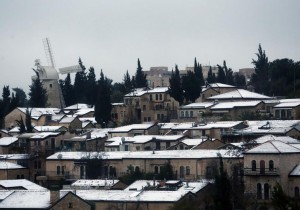Schools across the country closed due to inclement weather and snowfall which hit hardest in the northern Golan Heights and Upper Galilee. Heavy snow began falling in Gush Etzion in the early morning, blanketing much of the settlement bloc south of Jerusalem.
In Beit El, near Ramallah, snow accumulated as well. Bus lines ceased to run and most of the roads to and from the area were closed off.
But to the disappointment of many residents of the capital, Jerusalem was largely spared; only a few centimeters of snow fell and quickly melted. Nevertheless, the Education Ministry cancelled school and the Hebrew University was closed as well. In Jerusalem and nearby areas, classes were canceled in Efrat, Har Adar, Kiryat Arba, Beit El and Gush Etzion.
Schools in the Golan and northern Galilee have been closed since Wednesday due to heavy snow, giving adults and children alike an unexpected holiday. The beautiful white landscape has become a playground for snowmen and snowball fights. Highways in the area have been shut down.
In the South, classes were canceled in Arad, and the Negev town of Dimona closed schools due to a prolonged power outage.
The Israel Meteorological Service predicts that snow flurries will continue throughout the day in the central mountains as well as in the Negev highlands. Temperatures on Friday continued to drop, falling to below freezing in certain regions.
“The main thing is the drastic drop in temperatures,” Channel 1 meteorologist Sharon Wechsler told Israel Radio. “In the evening hours in most areas of the country…the temperatures will be around 0 degrees (Centigrade). And Jerusalem will hit minus 3! …The emphasis tonight is not to drive on the roads or stroll on the sidewalks because everything will be extremely slick with an accumulation of ice.”
Rain continued falling in the center and south of the country, with Saturday likely to see rain, accompanied by thunderstorms, gusts, and hail.
Despite the heavy rain and snowfall, the Sea of Galilee, Israel’s biggest reservoir, has only risen by about 8 centimeters (3 inches) since the start of the storm. But melting snow should eventually give a further boost to the depleted lake.

